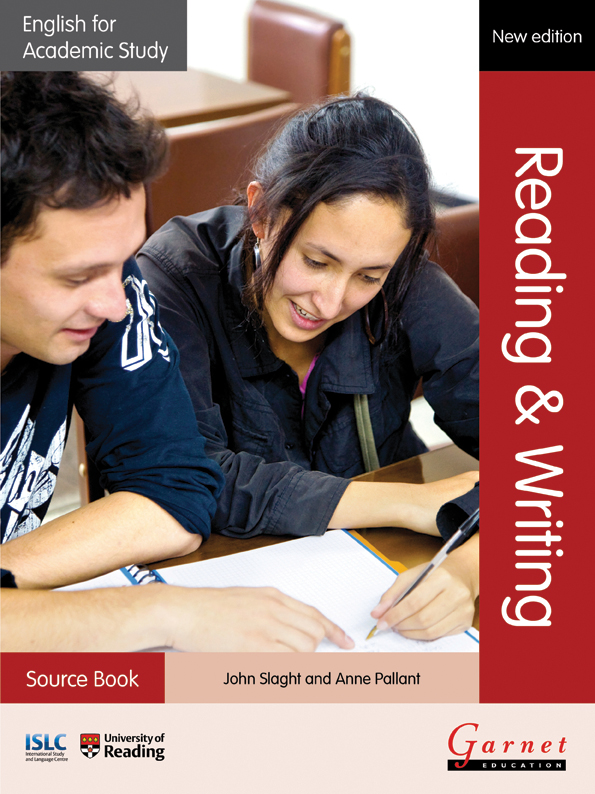About the book
English for Academic Study: Reading & Writing Source Book
This fully updated 2012 edition of the English for Academic Study: Reading & Writing Source Book accompanies the EAS: Reading and EAS: Writing Course Books, which can be studied separately or together in an integrated course. The EAS: Reading & Writing Source Book contains authentic and up-to-date academic texts that will help prepare students for academic life.
Each text covers an interesting and topical issue, with the aim of challenging and stimulating the reader. All texts are a suitable length and level for academic study, and are designed for use with the Course Books. They will help to develop both reading and writing skills.
This book can be used in conjunction with the following books in the English for Academic Study (EAS) series, also published by Garnet Education: EAS: Reading, EAS: Writing, EAS: Extended Writing & Research Skills, EAS: Speaking, EAS: Listening, EAS: Vocabulary, EAS: Pronunciation and EAS: Grammar for Writing.
Contents
Reading for academic purposes
Text 1a: Reading for academic purposes
Text 1b: The SQ3R reading and study system
Sustainable energy
Text 2a: Using waste, Swedish city cuts its fossil fuel use (1)
Text 2b: Using waste, Swedish city cuts its fossil fuel use (2)
The business of science
Text 3a: Stop selling out science to commerce
Text 3b: Is business bad for science?
Society today
Text 4a: Growing grey
Text 4b: Well connected? The biological implications of ‘social networking’
Text 4c: Telemedicine comes home
Food security
Text 5a: Diet and sustainability key to feeding the world: A food security report
Text 5b: The challenge of feeding 9 billion people
Text 5c: Closing the yield gap
Text 5d: Dealing with the situation
Human resource management
Text 6a: Background and origins of people management
Text 6b: International human resource management
Sustainable fashion
Text 7a: Material diversity
Text 7b: Sustainable fashion
Text 7c: The future of eco-fashion: A design-driven approach
The Tipping Point
Text 8a: The Tipping Point: How Little Things Can Make a Big Difference
Text 8b: Mental epidemics
Text 8c: An interview with Malcolm Gladwell
Text 8d: The Tipping Point by Malcolm Gladwell: Book review
Text 8e: Rumours, sneakers and the power of translation
Author details
Anne Pallant authored the Writing volume in Garnet Education’s EAS series. Anne has varied experience of teaching English for Academic Purposes. She has been teaching on EAP courses at the Centre for Applied Language Studies since 1994 and is part of the EAP Management team. She was also Director of Studies at a Language School in Italy.
Amongst other qualifications, Anne has obtained an MSc in Teaching English as a Foreign Language from Aston University, a P.G.C.E from the University of Bristol and a Certificate in Online Education and Training from the Institute of Education, University of London.
Whilst Anne is interested in the teaching of all skills within EAP courses, her current focus is on the teaching of academic writing skills and the development of appropriate materials and methodology. She is especially interested in the teaching of critical thinking skills in academic writing. Anne is also concerned with the teaching of study and research skills to prospective postgraduate students, and developing methods and materials through which the needs of students from different disciplines can be met in one classroom. She is also interested in teaching content-based courses and is presently involved in teaching writing to scientists and social scientists by electronic delivery and ‘e-learning’ methodology.
John Slaght has worked at the University of Reading in a variety of capacities since 1988 and currently works in the EAP department. He is Director of Assessment and Test Development in the International Study and Language Centre at the University. John has co-authored two books in Garnet Education’s English for Academic Study series: Reading and Extended Writing and Research Skills.
John has extensive overseas experience in Higher Education, having spent a total of 14 years teaching English, History and French in Africa, and Academic English in the Middle East. His work continues to take him to various areas of the globe. John is currently piloting a book of preparation materials for the Test of English for Educational Purposes and is planning further publications on Academic Reading and Language Testing. Currently, his responsibilities in testing include test administration and writing. He has been an item writer for Cambridge ESOL for a number of years and is regional team leader on a marking panel.
Reviews
“...one of the strengths of these books is that the tasks go beyond the ‘usual’ and really give the student practice at other essential university level reading skills, such as analysing the text for purpose, reading recall, annotating, comparing two texts, and reading with a focus question in mind.
The wide variety of skills and tasks presented requires the students to read and reread the texts, getting the most out of every page. And, if students find they need even more practice, there is a dedicated website for both students and teachers with links to additional websites for the skills practised.
All in all, this reading course book is ideal for someone who has a high English level and now wants to learn the skills and strategies necessary to be an efficient and effective reader at college level.”
Hilary Livingstone for IATEFL Voices, Issue 238, May-June 2014
“This high-quality series presents teaching materials underpinned by the latest research and honed by classroom feedback. Designed for teaching reading and writing either separately or in an integrated way (with the Source Book being essential for either option), it will help students develop important skills for tertiary settings in either case.”
Patrick Coleman (Lincoln University) for the TESOLANZ newsletter, September 2014



